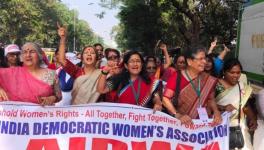Challenge to Exception to Marital Rape: Burden is on the Centre to Explain its Rationale, Amicus Curiae Tells Delhi HC
THE Delhi High Court on Tuesday continued to hear the arguments on a batch of petitions challenging Exception 2 to Section 375 of the Indian Penal Code (IPC) in the case of RIT Foundation & Ors. vs. Union of India.
Resuming his arguments, Amicus curiae and senior advocate, Rajshekhar Rao submitted that the burden really is on the Central Government to explain the rationale behind the classification of a married woman and an unmarried woman for the purpose of Exception 2 to Section 375.
Relying upon the decision of the Supreme Court in Hiral P. Harsora v. Kusum Narottamdas Harsora, Rao submitted that no one can claim special privileges and that all classes are equally subjected to the ordinary law of the land. He read out from the decision of the Supreme Court in State of U.P. v. Deoman Upadhyaya in which the Court had explained the expression ‘equality before the law’ as follows:
“…. Equality before law is a negative concept; equal protection of laws is a positive one. The former declares that every one is equal before law, that no one can claim special privileges and that all classes are equally subjected to the ordinary law of the land; the latter postulates an equal protection of all alike in the same situation and under like circumstances. No discrimination can be made either in the privileges conferred or in the liabilities imposed. But these propositions conceived in the interests of the public, if logically stretched too far, may not achieve the high purpose behind them. In a society of unequal basic structure, it is well-nigh impossible to make laws suitable in their application to all the persons alike. So, a reasonable classification is not only permitted but is necessary if society should progress. But such a classification cannot be arbitrary but must be based upon differences pertinent to the subject in respect of and the purpose for which it is made.”
In light of this, Rao submitted that what is the subject of the Exception and what is the purpose for which the Exception is made is something for the Union Government to explain that the classification is valid.
Relying on a Supreme Court judgment, Rao contended that overemphasis on the doctrine of classification or an anxious and sustained attempt to discover some basis for classification may gradually and imperceptibly deprive Article 14 of its glorious content.
Citing the decision of the Supreme Court in D.S. Nakara v. Union of India, Rao submitted that the burden to affirmatively satisfy the court that the twin tests of intelligible differentia having a rational relation to the object sought to be achieved by the Act would lie on the State, once it has been established that a particular piece of legislation is on its face unequal.
Rao cited numerous decisions explaining the principles guiding the Courts to examine the constitutional validity of a statute. Referring to Namit Sharma v. Union of India, Rao submitted “while good faith and knowledge of the existing conditions on the part of a legislature are to be presumed, if there is nothing on the face of the law or the surrounding circumstances brought to the notice of the court on which the classification may reasonably be regarded as based, the presumption of constitutionality cannot be carried to the extent of always holding that there must be some undisclosed and unknown reasons for subjecting certain individuals or corporations to hostile or discriminating legislation.”
Rao cited the decision of the Supreme Court in Mithu vs. State of Punjab, in which the Court had said: “These decisions have expanded the scope of Article 21 in a significant way and it is now too late in the day to contend that it is for the legislature to prescribe the procedure and for the courts to follow it; that it is for the legislature to provide the punishment and for the courts to impose it. Two instances, undoubtedly extreme, may be taken by way of illustration for the purpose of showing how the courts are not bound, and are indeed not free, to apply a fanciful procedure by a blind adherence to the letter of the law or to impose a savage sentence. A law providing that an accused shall not be allowed to lead evidence in self-defence will be hit by Articles 14 and 21. Similarly, if a law were to provide that the offence of theft will be punishable with the penalty of the cutting of hands, the law will be bad as violating Article 21. A savage sentence is anathema to the civilized jurisprudence of Article 21. These are, of course, extreme illustrations and we need have no fear that our legislatures will ever pass such laws. But these examples serve to illustrate that the last word on the question of justice and fairness does not rest with the legislature. Just as reasonableness of restrictions under clauses (2) to (6) of Article 19 is for the courts to determine, so is it for the courts to decide whether the procedure prescribed by a law for depriving a person of his life or liberty is fair, just and reasonable…”
Also Read: Amicus Curiae explains before Delhi HC why exception to marital rape should be struck down
In the Mithu case, while striking down Section 303 of the IPC, Justice Chinappa Reddy in his concurring opinion observed, “Section 303 Penal Code, 1860, is an anachronism. It is out of tune with the march of the times. It is out of tune with the rising tide of human consciousness. It is out of tune with the philosophy of an enlightened Constitution like ours. It particularly offends Article 21 and the new jurisprudence which has sprung around it ever since the Banks Nationalisation case [R.C. Cooper v. Union of India], and freed it from the confines of Gopalan [A.K. Gopalan v. State of Madras]. After the Banks Nationalisation case, no Article of the Constitution guaranteeing a fundamental right was to lead an isolated existence.”
Rao submitted that the Court needs to apply the same yardstick to examine the validity of the Exception to Section 375.
He added that we are fortunate to have a document that reminds us that our founders fought and gave to ourselves which places at centre the individual and their life, liberty and dignity. He read out Article 13 of the Constitution which provides for the judicial review of the legislation inconsistent with Part III of the Constitution. He argued that Article 13 proscribes the state to enact legislation in derogation of fundamental rights.
Rao cited the decision of the Supreme Court in the Navtej Singh Johar case, to highlight the role of the Court when it sees something is wrong. He submitted that under Article 13 read with Article 226, a High Court could strike down laws that are inconsistent with or in derogation of fundamental rights. He argued that this has been consistently interpreted as casting a positive obligation on constitutional courts to declare such laws as unconstitutional.
“The Constitution Framers could have never intended that the protection of fundamental rights was only for the majority population. If such had been the intention, then all provisions in Part III of the Constitution would have contained qualifying words such as “majority persons” or “majority citizens”. Instead, the provisions have employed the words “any person” and “any citizen” making it manifest that the constitutional courts are under an obligation to protect the fundamental rights of every single citizen without waiting for the catastrophic situation when the fundamental rights of the majority of citizens get violated”, Rao read out from Navtej Singh case.
In the Navtej Singh case, the Constitution Bench while reading down Section 377 IPC observed that the constitutional courts must not display an iota of doubt and must not hesitate in striking down such provision of law on the account of it being violative of the fundamental rights of certain citizens, however minuscule their percentage may be.
“The fundamental rights chapter is like the North Star in the universe of constitutionalism in India”, the Court had said.
Rao also referred to the decision of the Supreme Court in Anuj Garg v. Hotel Assn. of India. He read out from the said decision “it is to be borne in mind that legislations with pronounced “protective discrimination” aims, such as this one, potentially serve as double-edged swords. A strict scrutiny test should be employed while assessing the implications of this variety of legislations. Legislation should not be only assessed on its proposed aims but rather on the implications and the effects. The impugned legislation suffers from incurable fixations of stereotype morality and conception of sexual role. The perspective thus arrived at is outmoded in content and stifling in means”.
In Anuj Garg, the Court had observed that “No law in its ultimate effect should end up perpetuating the oppression of women. Personal freedom is a fundamental tenet which cannot be compromised in the name of expediency until and unless there is a compelling State purpose. Heightened level of scrutiny is the normative threshold for judicial review in such cases”.
In view of this, Rao contended that the state has to show compelling state purpose for providing Exception 2 to Section 375. Rao added that, in his opinion, there exists none.
Rao heavily relied upon the decision of the Supreme Court in Independent Thought vs. Union of India. In this case, a two-judge bench of the Supreme Court read down Exception 2 to Section 375 in so far as it relates to a girl child below 18 years of age.
Rao submitted that the Independent Thought case does evaluate Section 375 albeit in the context of a girl child below the age of 18 years since the general issue of marital rape was not before the Court.’
Rao submitted that it is not that the statute says that the consent is irrelevant but the effect of the Exception is that the consent becomes irrelevant for the purpose of the act of rape.
Exception 2 to Section IPC provides that it is not rape if a man has sexual intercourse with a girl above 15 years of age and if that girl is his wife. In other words, a husband can have sexual intercourse with his wife provided she is not below 15 years of age and this is not rape under IPC regardless of her willingness or her consent. He read out the passage from the Independent Thought that dealt with the effect of the Exception as follows-
“The result of the above three situations is that the husband of a girl child between 15 and 18 years of age has blanket liberty and freedom to have non-consensual sexual intercourse with his wife and he would not be punishable for rape under IPC since such non-consensual sexual intercourse is not rape for the purposes of Section 375 IPC. Very strangely, and as pointed out by Sakshi before the LCI, the husband of a girl child does not have the liberty and freedom under IPC to commit a lesser “sexual” act with his wife, as for example, if the husband of a girl child assaults her with the intention of outraging her modesty, he would be punishable under the provisions of Section 354 IPC. In other words, IPC permits a man to have non-consensual sexual intercourse with his wife if she is between 15 and 18 years of age but not to molest her. This view is surprisingly endorsed by the LCI in its 172nd Report adverted to above”.
Reading from the same judgement, Rao pointed out what the Court said on the right to bodily integrity. In the Independent Thought case, the Supreme Court had referred to the decision in State of Maharashtra v. Madhukar Narayan Mardikar in which it was observed “Even a woman of easy virtue is entitled to privacy and no one can invade her privacy as and when he likes. So also it is not open to any and every person to violate her person as and when he wishes. She is entitled to protect her person if there is an attempt to violate it against her wish. She is equally entitled to the protection of law.”
In the Independent Thought case, the Supreme Court had highlighted the anomalous state of affairs that existed on the reading of the IPC and the Protection of Children from Sexual Offences Act(POCSO).
It was observed: “If such is the traumatic impact that rape could and does have on an adult victim, we can only guess what impact it could have on a girl child—and yet it is not a criminal offence in the terms of Exception 2 to Section 375 IPC but is an offence under the Pocso Act only. An anomalous state of affairs exists on a combined reading of IPC and the Pocso Act. An unmarried girl below 18 years of age could be a victim of rape under IPC and a victim of penetrative sexual assault under the Pocso Act. Such a victim might have the solace (if we may say so) of prosecuting the rapist. A married girl between 15 and 18 years of age could be a victim of aggravated penetrative sexual assault under the Pocso Act, but she cannot be a victim of rape under IPC if the rapist is her husband since IPC does not recognise such penetrative sexual assault as rape. Therefore such a girl child has no recourse to law under the provisions of IPC notwithstanding that the marital rape could degrade and humiliate her, destroy her entire psychology pushing her into a deep emotional crisis and dwarf and destroy her whole personality and degrade her very soul. However, such a victim could prosecute the rapist under the Pocso Act. We see no rationale for such an artificial distinction”.
Rao cited this para to contend that Exception 2 to Section 375 carries the same artificial distinction when the wife is above the age of 18. Quoting from the same judgment, Rao submitted: “It must be remembered that those days are long gone when a married woman or a married girl child could be treated as subordinate to her husband or at his beck and call or as his property. Constitutionally a female has equal rights as a male and no statute should be interpreted or understood to derogate from this position. If there is some theory that propounds such an unconstitutional myth, then that theory deserves to be completely demolished.”
On the reasonability of the law, Rao cited the observations made by the Supreme Court in Satyawati Sharma v. Union of India in which it was observed that a legislation, which might be reasonable at the time of its enactment, could become unreasonable with the passage of time.
Rao contended that Exception 2 to Section 375 is discriminatory. He relied upon the observations made by Justice Deepak Gupta in his concurring opinion in the Independent Thought case. It was held:
“One more ground for holding that Exception 2 to Section 375 IPC is discriminatory is that this is the only provision in various penal laws which gives immunity to the husband. The husband is not immune from prosecution as far as other offences are concerned. Therefore, if the husband beats a girl child and has forcible sexual intercourse with her, he may be charged for the offences under Sections 323, 324, 325 IPC, etc. but he cannot be charged with rape. This leads to an anomalous and astounding situation where the husband can be charged with lesser offences, but not with the more serious offence of rape. As far as sexual crimes against women are concerned, these are covered by Sections 354, 354-A, 354-B, 354-C, 354-D IPC. These relate to assault or use of criminal force against a woman with intent to outrage her modesty; sexual harassment and punishment for sexual harassment; assault or use of criminal force to woman with intent to disrobe; voyeurism; and stalking respectively. There is no exception clause giving immunity to the husband for such offences.”
The Domestic Violence Act will also apply in such cases and the husband does not get immunity. There are many other offences where the husband is either specifically liable or may be one of the accused. The husband is not given the immunity in any other penal provision except in Exception 2 to Section 375 IPC. It does not stand to reason that only for the offence of rape the husband should be granted such an immunity especially where the “victim wife” is aged below 18 years i.e. below the legal age of marriage and is also not legally capable of giving consent to have sexual intercourse. Exception 2 to Section 375 IPC is, therefore, discriminatory and violative of Article 14 of the Constitution of India, on this count also”.
Rao thus contended that though the Independent Thought judgment clarified that it did not deal with the issue of marital rape in general, its observations in the said decision hold the field and that they are his arguments to criminalize the marital rape.
Responding to the Court’s concerns whether it would be creating an offence if it were to strike down the Exception, Rao submitted from the Independent Thought judgment in which Court had elaborately dealt with the same very argument. The Court had said:
“One of the doubts raised was if this Court strikes down, partially or fully, Exception 2 to Section 375 IPC, is the Court creating a new offence. There can be no cavil of doubt that the courts cannot create an offence. However, there can be no manner of doubt that by partly striking down Section 375 IPC, no new offence is being created. The offence already exists in the main part of Section 375 IPC as well as in Sections 3 and 5 of the Pocso Act. What has been done is only to read down Exception 2 to Section 375 IPC to bring it in consonance with the Constitution and the Pocso Act”.
It was held that the Court by reading down the Exception in so far as it relates to a child below the age of 18, was not creating any new offence but only removing what was unconstitutional and offensive.
Rao disagreed with the view that the status of marriage is sufficient to warrant denying a wife the ability to prosecute her husband for rape. He added that if the object was saving the institution, then the wife would not have been able to prosecute her husband for anything.
Rao concluded his arguments today.
Before closing the hearing for the day, Justice Harishankar asked senior advocate Rebecca John, who is also the amicus, in the case, to consider if the proposition made by Rao that ‘the exception disables the wife from prosecuting her husband’ is a proper analysis of the provision’. John will be addressing the Court tomorrow.
Get the latest reports & analysis with people's perspective on Protests, movements & deep analytical videos, discussions of the current affairs in your Telegram app. Subscribe to NewsClick's Telegram channel & get Real-Time updates on stories, as they get published on our website.
























